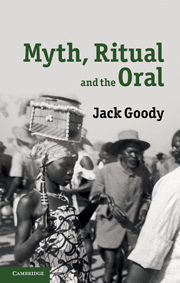Book contents
- Frontmatter
- Contents
- Acknowledgements
- Introduction
- 1 Religion and ritual from Tylor to Parsons: the definitional problem
- 2 Oral ‘literature’
- 3 The anthropologist and the audio recorder
- 4 Oral creativity
- 5 The folktale and cultural history
- 6 Animals, humans and gods in northern Ghana
- 7 The Bagre in all its variety
- 8 From oral to written: an anthropological breakthrough in storytelling
- 9 Writing and oral memory: the importance of the ‘lecto-oral’
- Appendix Folktales in northern Ghana
- References
- Index
1 - Religion and ritual from Tylor to Parsons: the definitional problem
Published online by Cambridge University Press: 05 June 2012
- Frontmatter
- Contents
- Acknowledgements
- Introduction
- 1 Religion and ritual from Tylor to Parsons: the definitional problem
- 2 Oral ‘literature’
- 3 The anthropologist and the audio recorder
- 4 Oral creativity
- 5 The folktale and cultural history
- 6 Animals, humans and gods in northern Ghana
- 7 The Bagre in all its variety
- 8 From oral to written: an anthropological breakthrough in storytelling
- 9 Writing and oral memory: the importance of the ‘lecto-oral’
- Appendix Folktales in northern Ghana
- References
- Index
Summary
This first chapter represents an early attempt to sort out the problem surrounding the use of the terms ritual and religion. I tried to do the same for myth in a joint article (with Ian Watt). They are very much a preliminary to my specific analyses of the ethnographic material. I thought that later usage had not solved earlier problems and that we relied on a ‘rationalist’ view, despite attempts to avoid this.
To begin with I want to explore the problem of what has been involved in categorizing acts and beliefs as religious, or ritual, or magico-religious, with the purpose not only of clearing the way for subsequent treatment of my own empirical data (mainly concerning the LoDagaa and Gonja of northern Ghana), but also of clarifying certain aspects of the analysis of social systems in general.
For some writers such an investigation has appeared a profitless enterprise. At the beginning of Themis: A Study of the Social Origins of Greek Religion, a book which, as its subtitle suggests, owes much to the work of the French sociologist Durkheim, as well as to the English anthropologists, the classical scholar Jane Harrison comments on the erroneous approach of those inquirers who start with a general term religion, of which they have a preconceived idea, and then try to fit into it any facts that come to hand.
- Type
- Chapter
- Information
- Myth, Ritual and the Oral , pp. 13 - 40Publisher: Cambridge University PressPrint publication year: 2010
- 1
- Cited by



